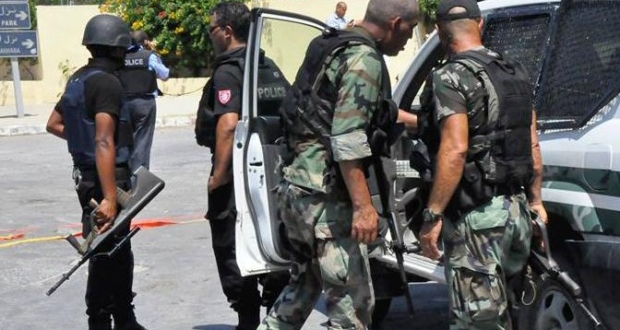The UK public needs to be prepared for the fact that many of those killed in the “savage” attack by an Islamic State extremist at a Tunisian beach resort were British, David Cameron has said.
The prime minister’s warning from Downing Street on Saturday, which echoed earlier comments made by his Tunisian counterpart, Habib Essid, came as planes evacuating holidaymakers began arriving back in the UK.
Isis has claimed responsibility for the killings in the popular holiday resort close to the town of Sousse, in which a young man pulled a Kalashnikov from a beach umbrella and began firing, killing at least 39 people.
An initial investigation by Tunisian authorities has shown that the gunman, Seifeddine Rezgui, who was killed by police, was not previously known to authorities, Essid said. Rezgui is understood to have come from the town of Gaafour in the governorate of Siliana and to be a student at Kairouan University.
Cameron will chair a meeting of the British government’s Cobra emergency committee on Saturday.
The foreign secretary, Philip Hammond, said five of those killed have so far been confirmed as Britons, but he warned that number could rise.
The health ministry in Tunisia said the dead included Tunisians, British, Germans and Belgians, but did not provide numbers.
Rafik Chelli, the interior minister, told Associated Press the attack was carried out by a young student not previously known to authorities. At least 36 people were reportedly wounded in the shooting spree, which ended when the gunman was shot dead by police.
The Site Intelligence Group reported that Isis had claimed responsibility for Friday’s attack on its Twitter account, referring to the gunman by his jihadi pseudonym Abu Yahya al-Qayrawani.
Essid said he would immediately close mosques outside the control of the ministry of religious affairs and call army reservists into active service around the country.
“No mosque that does not conform to the law will be tolerated,” he said, referring to those that incite terrorism.
Meanwhile, more survivors’ stories and details of the victims began to emerge. The British tourist Tom Richards, who faced the gunman in a hotel corridor, described him as being in his early 20s with long black hair and a beard. Richards, who was there with his mother, escaped when the gunman inexplicably stopped firing.
The Welshman Matthew James survived being shot three times when he used his body to shield his fiancée, Saera Wilson, during the shooting.
One of those killed has been named as Lorna Carty, a nurse and mother of two from County Meath in Ireland. She had been in the resort with her husband, Declan, who had recently undergone heart surgery. It is understood the couple were given the holiday as a present from a family member to help with his recuperation.
Tunisia’s president, Beji Caid Essebsi, denounced the attacks: “Once again, cowardly and traitorous hands have struck Tunisia, targeting its security and that of its children and visitors.”
Essebsi promised “painful but necessary” measures, adding: “No country is safe from terrorism, and we need a global strategy of all democratic countries.”
Elizabeth O’Brien, an Irish tourist who was with her two sons, told Irish Radio she was on the beach when the shooting began.
“I thought, ‘Oh my God. It sounds like gunfire,’ so I just ran to the sea, to my children and grabbed our things” before fleeing to their hotel room, she said.
Since overthrowing its secular dictator in 2011, Tunisia has been plagued by terrorist attacks, although only recently have they targeted the tourism sector, which makes up nearly 15% of GDP.
Simon Calder, a London-based travel commentator, said: “The Foreign Office will declare the summer effectively over for Tunisia, and it will destroy – besides the lives taken – the tens of thousands of livelihoods who depend on tourism for a living.” Nearly half a million Britons visited Tunisia in 2014.
Jonathan Hill, a professor of defence studies at King’s College London, said the attacks were a blow to Tunisia’s image as a stable, democratic nation emerging from its revolution in 2011.
“The terrorists are attacking Tunisia’s reputation,” he said. “Not just as a safe and welcoming destination for western holidaymakers, but as the one real success story to emerge out of the Arab Spring.”
Interpol offered investigative help in the wake of Friday’s violence. Its secretary general, Juergen Stock, said the attacks “show the truly global dimension to current terrorist threats”.
Associated Press contributed to this report






